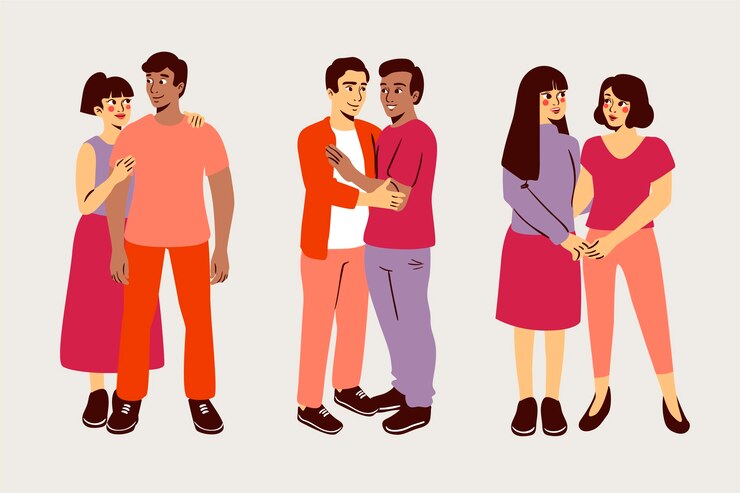Same-sex Marriages and LGBTQ+ Rights in India: A Legal Analysis

Introduction
The legal recognition of same-sex marriages and the rights of LGBTQ+ individuals in India is a topic of significant legal discourse and societal implications. This analysis aims to elucidate the current state of the law concerning same-sex marriages in India, the constitutional guarantees that impact LGBTQ+ rights, and the challenges faced by the community in securing legal recognition and protection.
Table of Contents
Historical Background
1. Criminalization of Homosexuality: Historically, homosexuality was criminalized under Section 377 of the Indian Penal Code (IPC), which categorically prohibited “unnatural offenses.” This provision subjected individuals engaged in consensual same-sex relationships to criminal prosecution, thereby perpetuating stigma and discrimination against the LGBTQ+ community.
2. Judicial Decriminalization: In Navtej Singh Johar v. Union of India (2018), the Supreme Court of India declared Section 377 unconstitutional insofar as it criminalized consensual sexual conduct between adults of the same sex. The Court opined that the criminalization of homosexuality violated fundamental rights enshrined in the Constitution, notably Articles 14 (Right to Equality), 15 (Prohibition of Discrimination), and 21 (Right to Life and Personal Liberty).
Legal Status of Same-sex Marriages
1. Absence of Statutory Framework: Despite the decriminalization of homosexuality, the Indian legal system lacks a statutory framework recognizing same-sex marriages. Existing marriage laws, such as the Hindu Marriage Act, 1955 and the Special Marriage Act, 1954, do not provide provisions for the solemnization of marriages between same-sex couples.
2. Pending Petitions: Several public interest litigations are currently pending before the Supreme Court seeking legal recognition for same-sex marriages. Petitioners argue that the denial of recognition constitutes a violation of their fundamental rights and undermines the dignity and autonomy of LGBTQ+ individuals.
3. Global Comparison: Jurisdictions worldwide, including numerous countries in North America and Europe, have recognized same-sex marriages, granting LGBTQ+ couples the same legal rights and protections afforded to heterosexual couples. The comparative analysis underscores a legal gap within the Indian legal framework.
Constitutional Guarantees and Rights
1. Fundamental Rights: The Indian Constitution guarantees the fundamental rights of all individuals, including those identifying as LGBTQ+. The Supreme Court has reinforced that discrimination based on sexual orientation contravenes the right to equality and dignity, essential components of a democratic society.
2. Rights to Family and Personal Autonomy: The right to form a family and enter into a relationship is intrinsic to personal autonomy. The denial of same-sex marriage recognition infringes upon the right of LGBTQ+ individuals to lead a life of dignity, free from state interference.
3. Judicial Pronouncements: In various judgments, the Supreme Court has acknowledged the right to love and associate freely with any individual. Such interpretations extend the application of constitutional protections to same-sex couples, reinforcing their claim to legal recognition.
Challenges Faced by LGBTQ+ Individuals
1. Social Stigma: Despite legal advancements, LGBTQ+ individuals continue to face considerable social stigma and discrimination. Familial rejection and societal ostracism contribute to mental health challenges within the community.
2. Legal Uncertainty: The absence of a legal framework for same-sex marriages creates ambiguity concerning the rights of same-sex couples, particularly regarding property rights, inheritance, and child custody.
3. Adoption and Parenthood: Current laws do not recognize the right of same-sex couples to adopt children, leading to legal and emotional complexities for families formed outside traditional marriage.
Recent Developments and Advocacy
1. Judicial Engagement: The Supreme Court has recently commenced hearings on petitions advocating for the recognition of same-sex marriages, signaling a potentially transformative moment in the legal landscape for LGBTQ+ rights.
2. Public Support and Activism: There has been a notable increase in public discourse surrounding LGBTQ+ rights, including organized pride marches and advocacy campaigns, which have garnered widespread support among younger demographics.
3. International Pressure: The global push for LGBTQ+ rights and recognition places additional pressure on India to align its legal framework with international human rights standards.
Conclusion
The legal recognition of same-sex marriages in India remains a complex and evolving issue. While the decriminalization of homosexuality represents a significant milestone, the absence of legal recognition for same-sex marriages poses ongoing challenges for LGBTQ+ individuals seeking equality and protection under the law.
To promote justice and equality, it is imperative for the Indian legal system to develop a comprehensive legal framework that recognizes same-sex marriages. Such recognition would not only uphold the rights and dignity of LGBTQ+ individuals but also contribute to the broader objective of fostering an inclusive and equitable society.
King Stubb & Kasiva,
Advocates & Attorneys
New Delhi | Mumbai | Bangalore | Chennai | Hyderabad | Mangalore | Pune | Kochi
Tel: +91 11 41032969 | Email: info@ksandk.com
By entering the email address you agree to our Privacy Policy.